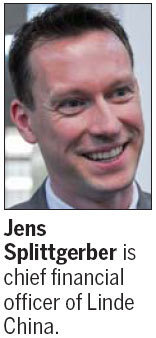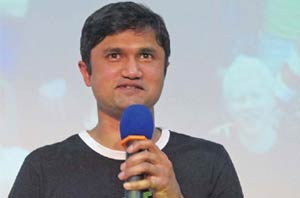Coastal city captivating
Updated: 2011-10-21 11:14
By Lu Chang and Hu Meidong (China Daily European Weekly)
|
|||||||||
Linde China CFO is drawn to Xiamen for its relaxing lifestyle, modern look
When Jens Splittgerber's work contract was coming to an end last year, he could have moved to a bigger city in China that offers international flair and business opportunities, such as Shanghai or Beijing.
|
 |
But the 42-year-old German decided to extend his contract to stay in Xiamen, a port city in the south of Fujian province, because he already considers it his home.
"Beijing and Shanghai are good for working, but they are too big, crowded and polluted, thus not good for living," says Splittgerber, who lives in Xiamen with his wife and 6-month-old son. "Here, however, it is a totally different story. With palm trees, nice beaches and fine weather, it's a perfect place for a work and life balance, at least in our Western mindset."
Splittgerber, who hails from a small town of 10,000 residents in the middle of Germany, moved to Xiamen in 2005 to work for Linde China, a German forklift truck company. Linde China opened its Asia base in Xiamen in 1993.
Before Splittgerber took up employment there, he knew nothing about the city. Splittgerber was amazed when he first saw the blend between old and new, charming lanes of old Mediterranean-style structures facing modern skyscrapers and thriving commercial areas.
"Xiamen is, in certain areas, much more developed than some European cities," says Splittgerber, who compared it to Hamburg, a German port city with 2 million people. "Though the two cities are similar in size, the development in Xiamen is much faster and better and the local economy is still growing with a rate nearly five times higher than Hamburg."
Being one of the first four special economic zones in China, Xiamen was voted as the nicest place to live in the country in 2007 in a survey conducted by Horizon Research Consultancy Group.
"In Germany, we are afraid of changing anything, because what has worked in the past is still working currently and may also work in the future. This is a different mindset."
As the chief financial officer of Linde China, Splittgerber has loads of praise for his Chinese colleagues whom he refers to as very flexible.
But he also admits that sometimes when dealing with other Chinese people, he has to make some compromises because of different mindsets.
"As a German, we are used to sticking to the rules and we like either black or white decisions. But here, everything has a kind of gray area," he says. "Germans tend to be very straightforward, while the Chinese are different."
After six years in Xiamen, Splittgerber describes it as "green, fast-growing and a place with easy life".
"Unlike big cities, where you never know whether you need half an hour or two hours going from A to B, Xiamen is doing quite a good job in building infrastructure to reduce traffic."
Xiamen was listed as the top 10 tourism destinations in 2007 by leading travel website Ctrip.com. The small, tranquil island of Gulangyu, a 5-minute ferry ride from Xiamen's wharf, was also selected among Chinese youth's favorite tourist spots by China Youth Daily, with its quirky streets and alleys, tourist shops and restaurants, clean beaches and waterfront views.
More than 1.3 million tourists visited the city during the Golden Week of National Day, which started Oct 1, raking in nearly 1.4 billion yuan ($219 million, 159 million euros) of revenue.
But the people of Xiamen have more to be proud of than just their city's tourism resources, their pleasant climate and beautiful surroundings. Xiamen is on the southeast coast of China, the Taiwan Straits lapping at its shore and the regional center for logistics and business operations. It also has several conference and exhibition venues and 72 star-rated hotels, including eight with five stars and 21 with four stars, making it an ideal location for shopping and businesses.
Yet Splittgerber is also aware that in a second-tier city such as Xiamen, many features of a large metropolis, such as international-level medical care and an efficient banking system, are absent.
"Medical care is an issue here to find a similar way of treatment of what I'm used to in Germany," Splittgerber says. "Luckily, so far, there was no need for me to go to hospital. But I'm always thinking what will happen if I had an accident? Would I go for a surgery here or try to fly back (home)?"
Splittgerber says he thinks the medical system in Xiamen is not as advanced compared to European standards. He says hospitals are always crowded and there's no privacy.
Apart from the medical care, banking system is another concern for Splittgerber. He finds it hard to understand the numerous approvals and procedures, which makes it difficult to deal with business.
"But the good news is that everyone is very flexible."









